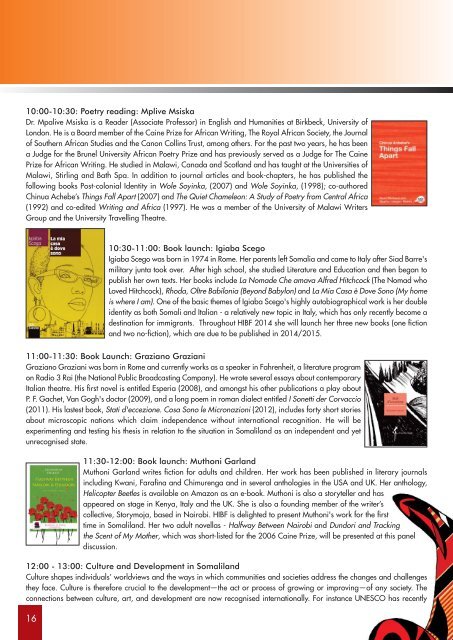1ue4FyT
1ue4FyT
1ue4FyT
You also want an ePaper? Increase the reach of your titles
YUMPU automatically turns print PDFs into web optimized ePapers that Google loves.
10:00-10:30: Poetry reading: Mplive Msiska<br />
Dr. Mpalive Msiska is a Reader (Associate Professor) in English and Humanities at Birkbeck, University of<br />
London. He is a Board member of the Caine Prize for African Writing, The Royal African Society, the Journal<br />
of Southern African Studies and the Canon Collins Trust, among others. For the past two years, he has been<br />
a Judge for the Brunel University African Poetry Prize and has previously served as a Judge for The Caine<br />
Prize for African Writing. He studied in Malawi, Canada and Scotland and has taught at the Universities of<br />
Malawi, Stirling and Bath Spa. In addition to journal articles and book-chapters, he has published the<br />
following books Post-colonial Identity in Wole Soyinka, (2007) and Wole Soyinka, (1998); co-authored<br />
Chinua Achebe’s Things Fall Apart (2007) and The Quiet Chameleon: A Study of Poetry from Central Africa<br />
(1992) and co-edited Writing and Africa (1997). He was a member of the University of Malawi Writers<br />
Group and the University Travelling Theatre.<br />
10:30-11:00: Book launch: Igiaba Scego<br />
Igiaba Scego was born in 1974 in Rome. Her parents left Somalia and came to Italy after Siad Barre's<br />
military junta took over. After high school, she studied Literature and Education and then began to<br />
publish her own texts. Her books include La Nomade Che amava Alfred Hitchcock (The Nomad who<br />
Loved Hitchcock), Rhoda, Oltre Babilonia (Beyond Babylon) and La Mia Casa è Dove Sono (My home<br />
is where I am). One of the basic themes of Igiaba Scego's highly autobiographical work is her double<br />
identity as both Somali and Italian - a relatively new topic in Italy, which has only recently become a<br />
destination for immigrants. Throughout HIBF 2014 she will launch her three new books (one fiction<br />
and two no-fiction), which are due to be published in 2014/2015.<br />
11:00-11:30: Book Launch: Graziano Graziani<br />
Graziano Graziani was born in Rome and currently works as a speaker in Fahrenheit, a literature program<br />
on Radio 3 Rai (the National Public Broadcasting Company). He wrote several essays about contemporary<br />
Italian theatre. His first novel is entitled Esperia (2008), and amongst his other publications a play about<br />
P. F. Gachet, Van Gogh's doctor (2009), and a long poem in roman dialect entitled I Sonetti der Corvaccio<br />
(2011). His lastest book, Stati d'eccezione. Cosa Sono le Micronazioni (2012), includes forty short stories<br />
about microscopic nations which claim independence without international recognition. He will be<br />
experimenting and testing his thesis in relation to the situation in Somaliland as an independent and yet<br />
unrecognised state.<br />
11:30-12:00: Book launch: Muthoni Garland<br />
Muthoni Garland writes fiction for adults and children. Her work has been published in literary journals<br />
including Kwani, Farafina and Chimurenga and in several anthologies in the USA and UK. Her anthology,<br />
Helicopter Beetles is available on Amazon as an e-book. Muthoni is also a storyteller and has<br />
appeared on stage in Kenya, Italy and the UK. She is also a founding member of the writer’s<br />
collective, Storymoja, based in Nairobi. HIBF is delighted to present Muthoni's work for the first<br />
time in Somaliland. Her two adult novellas - Halfway Between Nairobi and Dundori and Tracking<br />
the Scent of My Mother, which was short-listed for the 2006 Caine Prize, will be presented at this panel<br />
discussion.<br />
12:00 - 13:00: Culture and Development in Somaliland<br />
Culture shapes individuals’ worldviews and the ways in which communities and societies address the changes and challenges<br />
they face. Culture is therefore crucial to the development—the act or process of growing or improving—of any society. The<br />
connections between culture, art, and development are now recognised internationally. For instance UNESCO has recently<br />
16


